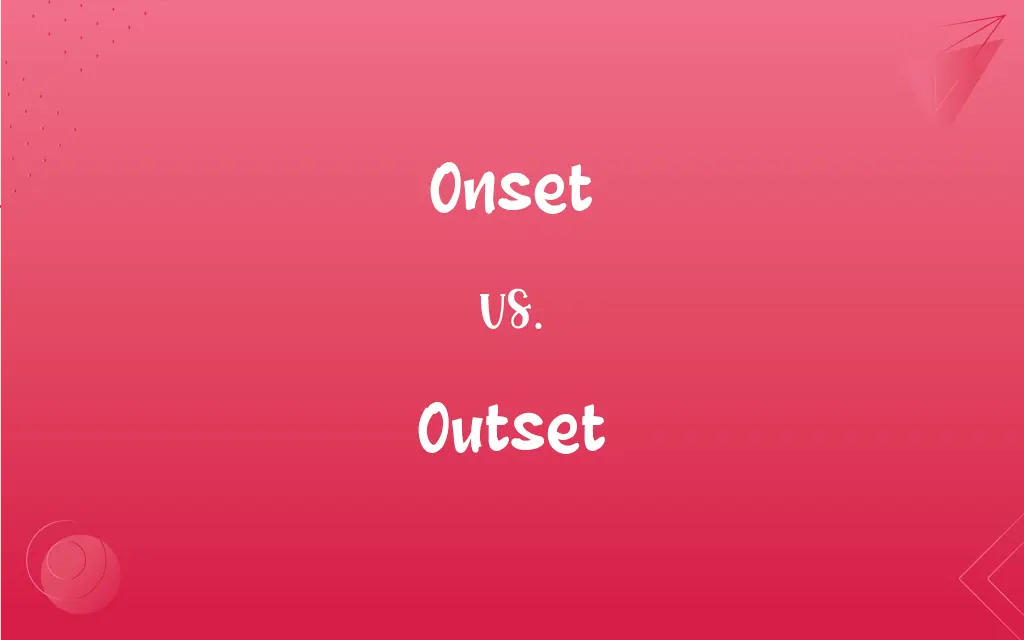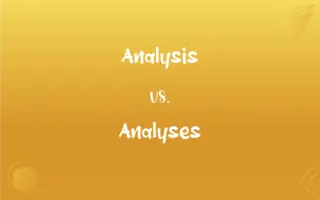Onset vs. Outset: What's the Difference?
Edited by Aimie Carlson || By Harlon Moss || Updated on October 22, 2023
Onset refers to the beginning of something, especially something unpleasant, while outset generally refers to the start or beginning of a venture or process.

Key Differences
Onset and outset are both nouns that deal with beginnings. While onset often pertains to the start of something undesirable or sudden, like an illness or conflict, outset usually refers to the start or initial phase of an action, journey, or project.
When considering the onset of a situation, it usually signifies the moment or period when something starts to happen or take effect. On the other hand, the outset of a situation generally emphasizes the very beginning or the starting point of an event or a period.
For instance, if someone talks about the "onset of winter," they're referring to the time when winter starts manifesting its signs, which could be abrupt. However, if someone mentions the "outset of a trip," they're talking about the time right when the trip begins.
Onset can also suggest the arrival or initiation of symptoms or effects, as in diseases. For instance, the "onset of a migraine" implies the moment when migraine symptoms start. Outset doesn't carry this nuance; instead, it might be used in contexts like "at the outset of his career," denoting the commencement of someone's professional journey.
In summary, while both onset and outset denote beginnings, onset often indicates the emergence or start of a condition or situation, and outset indicates the commencement of an action or process.
ADVERTISEMENT
Comparison Chart
Primary Usage
Often denotes the beginning of something unpleasant or sudden.
Denotes the initial phase or starting point of an action or venture.
Example Context
Diseases, conflicts, or weather changes.
Journeys, projects, or endeavors.
Connotation
Can have a negative connotation.
Generally neutral, just indicates the start.
Synonym
Commencement (of symptoms, etc.)
Inception (of a project, etc.)
Phrases
"onset of symptoms"
"at the outset"
ADVERTISEMENT
Onset and Outset Definitions
Onset
The emergence or first appearance of something.
The onset of symptoms caused her concern.
Outset
The commencement or introductory phase.
At the outset, the idea seemed promising.
Onset
The moment or period something starts to happen.
With the onset of darkness, the campfire became our only light.
Outset
The beginning or start of an action or process.
We faced challenges right from the outset of the project.
Onset
The initiation of an effect or state.
The medication takes effect shortly after its onset.
Outset
The initiation of a journey or endeavor.
At the outset of his journey, he was filled with enthusiasm.
Onset
The beginning or start of something.
The onset of the storm was sudden and unexpected.
Outset
The starting point or origin of an event.
Mistakes made at the outset can be costly in the long run.
Onset
The commencement of a condition or situation.
The onset of diabetes can be managed with lifestyle changes.
Outset
The initial stage or moment of something.
From the outset, it was clear they were destined for success.
Onset
The beginning or start of something
The onset of a cold.
Outset
The initial stage of something; the beginning
Problems arose at the very outset.
FAQs
Which word might relate more to a project's beginning?
Outset, as in "at the outset of a project."
Is "at the outset" a common phrase?
Yes, it's a common way to refer to the start of something.
Is the word "onset" always negative?
No, while "onset" often refers to the start of something unpleasant, it can be used neutrally to denote the beginning of anything.
Can "outset" and "onset" be used interchangeably?
Not always. While both refer to beginnings, "onset" often emphasizes emergence or start of conditions, whereas "outset" highlights the start of actions or processes.
Would you use "outset" to describe the beginning of winter?
No, "onset of winter" would be more appropriate.
Is the onset always abrupt?
Not necessarily, but it often denotes a noticeable or marked beginning.
Can onset be used in a positive context?
Yes, it simply indicates a beginning, though often used for unpleasant starts.
Does "outset" indicate duration?
No, it simply refers to the starting point or initial phase.
Can "outset" be used in a poetic context?
Yes, like any word, it can be used poetically to indicate a beginning.
Can "onset" refer to the start of an event?
Yes, it can refer to the beginning or start of any event or situation.
Which word has a more medical context?
Onset, as it's often used to describe the start of symptoms or diseases.
How is "onset" pronounced?
It's pronounced as "on-set."
Which word might relate more to diseases?
Onset, as in "onset of symptoms."
Are there synonyms for onset?
Yes, words like "commencement" or "start" can be synonyms, depending on the context.
Is "onset" a modern word?
No, "onset" has been in use for centuries, though its contexts might evolve.
In which situations should I avoid using "onset" and "outset" interchangeably?
When referring to specific contexts like diseases (onset) or projects (outset).
Are there synonyms for outset?
Yes, words like "inception" or "beginning" can be synonyms.
Can I say "onset of an idea"?
While it's understandable, it's more common to say "outset of an idea" or "birth of an idea."
Can "outset" mean "outside"?
No, "outset" relates to beginnings, not to a location outside something.
How is "outset" pronounced?
It's pronounced as "out-set."
About Author
Written by
Harlon MossHarlon is a seasoned quality moderator and accomplished content writer for Difference Wiki. An alumnus of the prestigious University of California, he earned his degree in Computer Science. Leveraging his academic background, Harlon brings a meticulous and informed perspective to his work, ensuring content accuracy and excellence.
Edited by
Aimie CarlsonAimie Carlson, holding a master's degree in English literature, is a fervent English language enthusiast. She lends her writing talents to Difference Wiki, a prominent website that specializes in comparisons, offering readers insightful analyses that both captivate and inform.































































